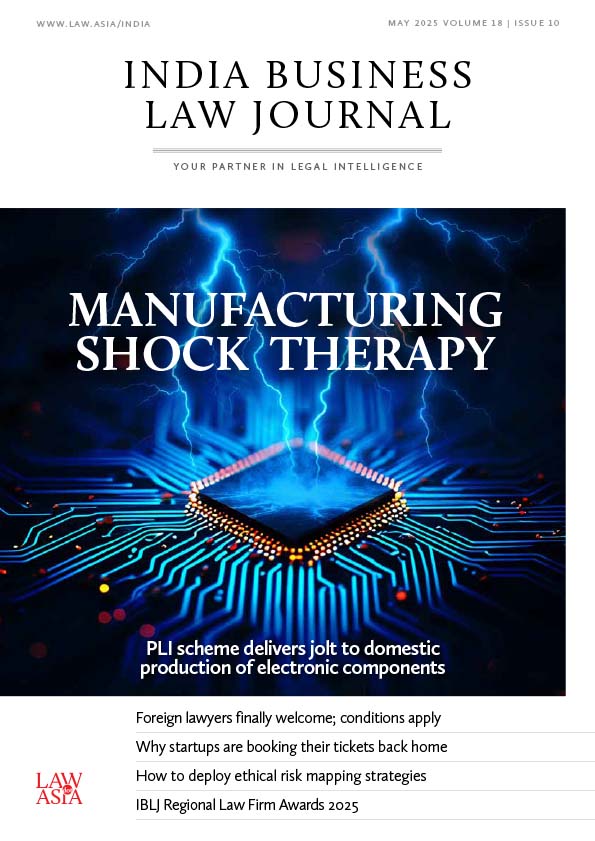India Business Law Journal – March 2025
Volume 18, Issue 8
Subscribe now to read India Business Law Journal in full and unlock our full archive and a vast resource of legal intelligence.
Highlights:
Cracking the code
Despite negatives, the IBC’s processes have matured
Prominent voices such as the former governor of the Reserve Bank of India (RBI), Shaktikanta Das, have raised concerns about the long delays and low recoveries in the corporate insolvency resolution process (CIRP) and called for changes. Despite more resolution plans seeing approval, the average time to complete a CIRP rose to 843 days in the financial year ending March 2024, far exceeding the mandated 330 days. Investors recovered 28% in the same period as per RBI figures. India’s corporate insolvency scenario, once portrayed as possessing immense opportunity, has been a mixed bag in terms of challenges and opportunities.
With this in mind, our Cover story is an interview with Ishita Sharan, legal head of the National Asset Reconstruction Company (NARCL), a government backed organisation that acquires and resolves bad debts from banks and financial institutions. Sharan’s organisation has set an ambitious goal of tackling INR2 trillion (USD22.9 billion) worth of stressed or non-performing assets by FY2026.
Sharan shares her views on the current insolvency landscape, the factors that have contributed to a decline in non-performing assets (NPAs), and the impact of the insolvency and bankruptcy code (IBC). She also discusses challenges such as delays in the admission of troubled companies in the corporate insolvency resolution process, and runaway timelines that have led to value erosion and diminished recoveries. Despite this, Sharan observes that the IBC has been in operation for nearly a decade, and this time has allowed it to mature its processes and serve as a powerful tool for resolving distressed assets.
Another segment, our newest, which has industry experts answering pressing questions about significant developments in law is Legal Q&A. The subjects covered in this issue are: the country’s consumer protection authority issuing guidelines on preventing greenwashing, and holding businesses accountable; the new rules from the Singapore International Arbitration Centre and what they mean for Indian businesses; the structural reforms introduced at the Indian Patent Office to significantly increase the number of granted patents; and the much-awaited draft Digital Personal Data Protection Rules, 2025, released by the government.
The subject of data privacy is of significant importance, with several provisions of the Digital Personal Data Protection Act, 2023 (DPDP Act), to be operationalised through delegated legislation, or “rules”, which are out in draft form. For this edition’s Data Privacy Guide, we present articles from leading firms in this domain. Starting with an overview of the draft data privacy rules, PSA meticulously goes over each aspect introduced in the proposed rules, including children’s privacy. Shivadass & Shivadass Law Chambers dives deeper into this and explains India’s approach to protecting the data privacy of children in a world where access to the internet is an asset for today’s generation, but also an ever-present threat that could culminate in tragedy with a wrong click.
Most generative AI models are based on self-learning from the kinds of prompts they receive. This poses privacy issues when people input personal information or information about their companies to get answers. ADP Law Offices looks at the development of AI tools and technologies and data privacy implications given the large datasets used for training AI. Taking the perspective of the banking and financial sector, AK & Partners calls on industry players to ensure its long-term contracts align with the DPDP’s provisions, even before its enforcement, given the dramatic way it requires customer data to be handled.
Another industry also seeing big shifts is the auto sector. Electric vehicles are becoming increasingly common on Indian roads, but require charging stations to be commonplace for the widespread adoption of EVs. For this issue’s What’s the deal?, Pooja Gupta, deputy general manager (legal) at Ather Energy talks about the regulatory framework in place for the installation of charging stations. EV guidelines from the Ministry of Power aim for at least one charging station within a 1km by 1km grid in urban areas by FY2030. However, challenges to make this vision achieve such a scale include securing suitable land, lengthy agreement processes, and risks of decommissioning due to title defects or contract disputes.
While the government’s clean energy goals are yet to materialise, in Vantage point, Mikhail Behl, a dual-qualified practising lawyer active in both India and the UK, calls for caution with cases relating to trade dress protection. This is because once granted, the protection is treated as perpetual and gives monopolistic rights to a manufacturer with regards to the shape of the product. But when refused, it dissuades proprietors and manufacturers from investing in the development of their products. While explaining how this imbalance came about, possible solutions are also mentioned with established jurisprudence.
In this issue
Powering India’s EV future
Energy counsel Pooja Gupta outlines key steps and challenges in setting up EV charging stations to boost electric vehicle adoption
Legacies must be respected and protected
Sir Ratan Tata Trust and Tata Sons sought an injunction over misuse of their trademarks and Sir Ratan Tata’s name
Forfeiting gratuity when disciplinary proceedings are held
SC allows gratuity forfeiture for employee misconduct involving moral turpitude
Shaping the law
Why some recent decisions from courts granting or refusing trade dress protection are contentious
India Data Privacy Guide
Understanding and complying with India’s new data protection regime...
































